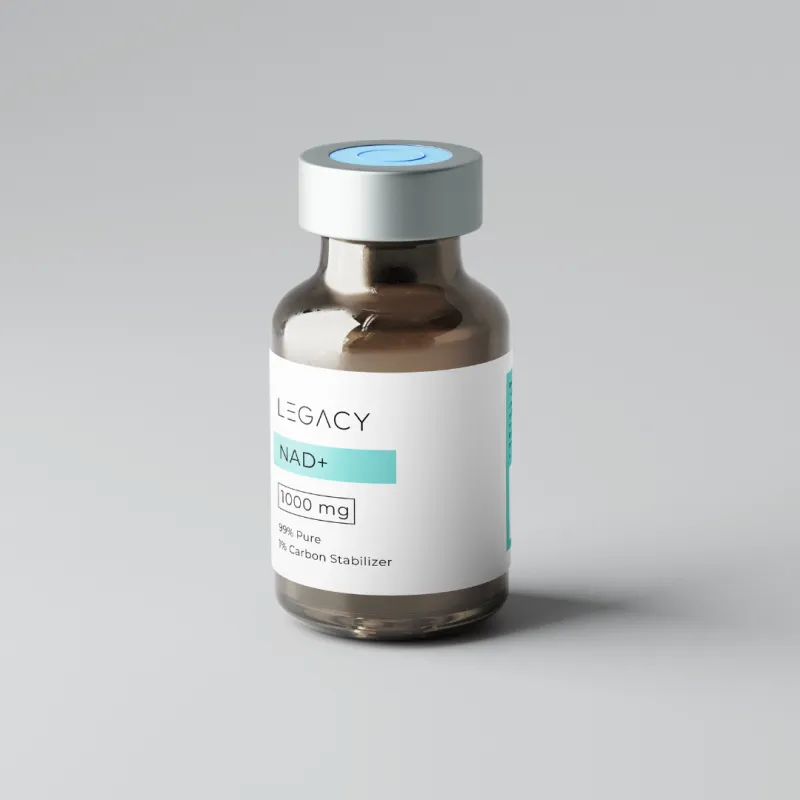Product Usage: This product is designated as a "Novelty Peptide" and is intended solely for specialized applications in controlled settings. It is not intended for any specific biological, therapeutic, or diagnostic use. All information provided on this website is for informational and educational purposes only and should not be construed as guidance for any particular application or usage.
What Is NAD+ 1000MG?
Nicotinamide adenine dinucleotide (NAD+) is a critical coenzyme found in all living cells that plays a central role in cellular metabolism and energy production. It functions as an electron carrier in redox reactions and serves as a substrate for various enzymes involved in cellular processes such as DNA repair, gene expression regulation, and cellular signaling. NAD+ levels tend to decline with age, and this decline has been associated with various age-related diseases and metabolic disorders. Consequently, NAD+ has emerged as a promising target for therapeutic interventions aimed at improving healthspan and potentially lifespan.
Structure

Sequence: Not applicable (NAD+ is not a peptide)
Molecular Formula: C21H27N7O14P2
Molecular Weight:663.43 g/mol
CAS Number:53-84-9
Synonyms: Diphosphopyridine nucleotide, Coenzyme I, Codehydrogenase I, DPN, NAD (oxidized)
Research Findings
- Metabolic Regulation: NAD+ plays a crucial role in energy metabolism, serving as a cofactor for enzymes involved in glycolysis, the citric acid cycle, and oxidative phosphorylation.
- Sirtuin Activation: NAD+ is a required substrate for sirtuin enzymes, which are involved in various cellular processes including gene expression regulation, DNA repair, and metabolic homeostasis.
- DNA Repair: NAD+ is utilized by poly(ADP-ribose) polymerases (PARPs) in the process of DNA repair, helping to maintain genomic stability.
- Age-Related Decline: Studies have shown that NAD+ levels decrease with age in various tissues, potentially contributing to age-related cellular dysfunction and disease.
- Therapeutic Potential: Preclinical and some clinical studies have demonstrated that boosting NAD+ levels through precursor supplementation or other means may have beneficial effects on metabolic health, cardiovascular function, and neurodegenerative diseases.
Future Research Directions
- Long-term Safety Studies: Extended research is needed to evaluate the long-term effects and safety profile of NAD+ boosting interventions in humans.
- Optimal Delivery Methods: Investigation into the most effective ways to increase NAD+ levels in specific tissues and cell types.
- Clinical Applications: Further clinical trials are required to determine the efficacy of NAD+ boosting strategies in treating or preventing age-related diseases.
- Combination Therapies: Exploration of potential synergistic effects of NAD+ boosters with other therapeutic agents or lifestyle interventions.
- Mechanism of Action: Additional studies to fully elucidate the molecular mechanisms by which NAD+ and its metabolites influence cellular health and longevity.
References
-
Poljšak B, Kovač V, Milisav I. Current Uncertainties and Future Challenges Regarding NAD+ Boosting Strategies. Antioxidants. 2022; 11(9):1638. [Online].
Available: https://www.ncbi.nlm.nih.gov/pmc/articles/PMC9495723/ -
Gilmour BC, et al. The Role of NAD+ in Regenerative Medicine. Cells. 2022; 11(19):3057. [Online].
Available: https://www.ncbi.nlm.nih.gov/pmc/articles/PMC9512238/ -
Mehmel M, et al. NAD+ Metabolism in Cardiac Health, Aging, and Disease. Circulation. 2021; 144(22):1795-1817. [Online].
Available: https://www.ahajournals.org/doi/full/10.1161/CIRCULATIONAHA.121.056589 -
Covarrubias AJ, et al. NAD+ metabolism and its roles in cellular processes during ageing. Nat Rev Mol Cell Biol. 2021; 22(2):119-141. [Online].
Available: https://www.ncbi.nlm.nih.gov/pmc/articles/PMC7963035/ -
Sultani G, et al. NAD+: a key metabolic regulator with great therapeutic potential. J Neuroendocrinol. 2017; 29(10):e12508. [Online].
Available: https://pubmed.ncbi.nlm.nih.gov/28580642/


